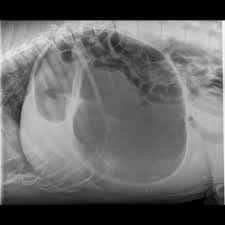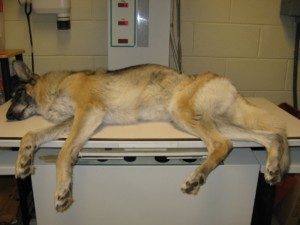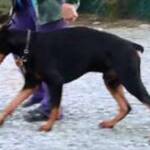Bloat is a life-threatening condition in which the stomach fills with air (dilatation) and/or twists upon itself (volvulus), hence the acronym GDV.
Symptoms of Bloat:
It is essential that this condition be recognized immediately or very early on. In most cases, your dog’s abdomen will have a distended appearance and is rock hard. But if the symptoms fit and you don’t see a distended abdomen, you should still rush your dog to a veterinarian or an ER. On occasion the abdomen may not have a bloated appearance.

appearance for bloat. Seen here is the stomach
bloated and flipped over on itself

with gas
Signs of bloat include:
- Drooling of saliva
- Frequent retching and attempts to vomit (occasionally patients may be able to regurgitate a pool of foamy saliva)
- Anxiety, restlessness, and pacing
- Lethargy or agitation
- Depression and shock
- Collapse
What to Do
- Go to a veterinary hospital or emergency facility immediately. In all cases, this condition requires professional assistance very quickly. Almost all cases require surgery.
What NOT to Do
- Do not attempt to relieve the gas from the stomach.
- Do not give anything by mouth.
Much has been learned about bloat over the last 10 years and, if recognized early, the survival rate is near 80 percent if the dog is taken quickly into surgery.
As your companion’s owner, you play a crucial role in knowing what to look for and bringing your dog to your veterinarian for early intervention, which involves stabilization for shock, removing gas and surgery. After stabilization for shock, your pet has a better chance for survival. Extremely aggressive medical and surgical intervention early in the course of bloat is correlated to higher survival.
Prevention
Research into this area is ongoing and many studies have produced conflicting results. No one intervention has been shown to prevent GDV. Elevated feeding may actually increase the risk of GDV in some patients. Smaller kibble size, feeding smaller more frequent meals, and not breeding animals with a history of GDV in their lineage may potentially decrease the risk of GDV for the animal and future generations.
In breeds with a high risk of bloat, such as Great Danes, German Shepherd Dogs, and Akitas (as well as other deep chested dogs), a preventive surgery called a prophylactic gastropexy can often be performed when the dog is being spayed or neutered. This involves surgically attaching the stomach to the inside of the abdomen to prevent rotation. Ask your veterinarian for details and advice if you would like to discuss preventive surgery for bloat.
Animal Hospital in Houston Heights
Urban Animal Veterinary Hospital
1327 Yale St
Houston, TX 77008
(713) 863-008


